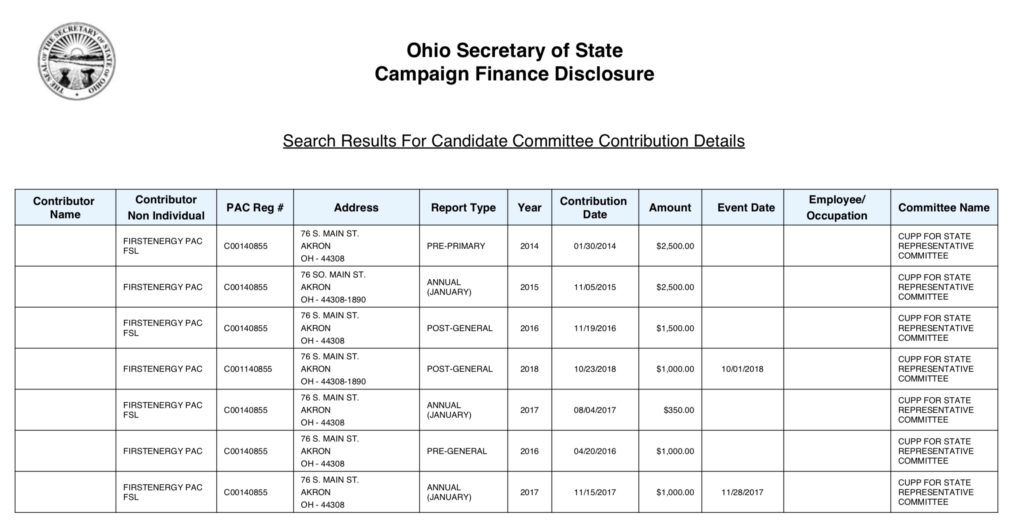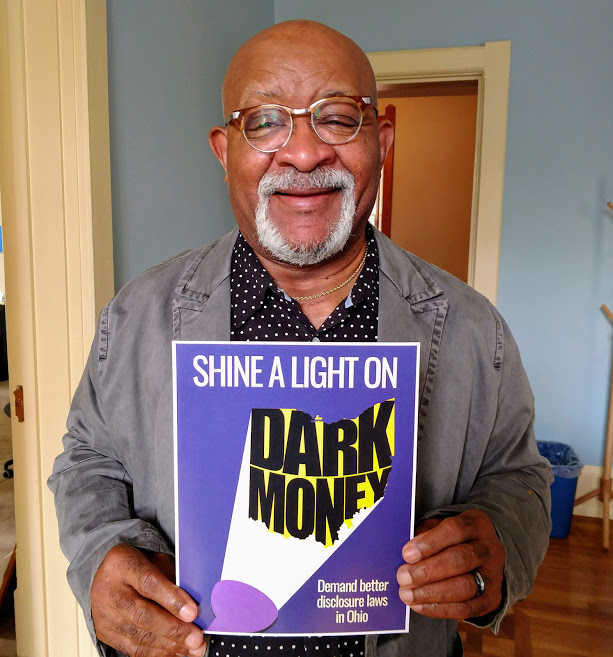The Ohio state legislature made headlines recently for dramatic federal indictments in a bribery scheme that resulted in the passage of a $1.3 billion bailout for two nuclear energy plants owned by electric company FirstEnergy. The emergency bailout, which also weakened the state’s renewable energy goals, was described by climate journalists as “the worst energy bill of the 21st century.”
But FirstEnergy’s push to pass that bill (HB 6), in ways ranging from overt and legal to covert and allegedly illegal, was not the first time in the past few years that the state’s energy industry had sought an enormous bailout from ratepayers.
In July, the FBI subpoenaed the Ohio House for records related to four bills from between 2017 and 2019 that also sought to bail out the two FirstEnergy nuclear plants at the center of the alleged racketeering scheme, according to a recent report by Cleveland.com. Along with HB 6, which was passed in July 2019, the three other bills were advanced with an active role from Ohio House Majority Leader Bill Seitz, a Republican who represents a district around Cincinnati and has served in the state legislature for almost two decades.
Emails and other records obtained by Energy and Policy Institute policy and communications manager Dave Anderson show that Seitz worked with FirstEnergy’s director of state affairs in Ohio, Ty Pine, to draft a 2017 bill to subsidize the nuclear plants. A separate bill Seitz worked on as chair of both the Ohio House Majority Caucus Policy Committee and the Public Utilities Committee that would have weakened state energy standards was supported in a private letter offering help from Robert Murray, the CEO of coal company Murray Energy. Seitz drafted another bill subsidizing coal plants with Christine Wright, the manager of state government affairs for the major utility American Electric Power (AEP) Ohio.
Seitz told Sludge he has “fully complied” with the federal investigation into the energy bills he worked on with industry representatives.
“There is absolutely nothing wrong with collaborating with interested parties on legislation as it is being developed,” Seitz said when asked about his work with Pine.
Rep. Seitz is considering a run for House Speaker next year, according to the Cincinnati Enquirer, and Seitz continues to support HB 6 even after the legislative actions to pass it have been indicted as a potential violation of federal law prohibiting outside groups from directly coordinating with political campaigns.
Republican Speaker Bob Cupp, who replaced the indicted former Speaker Larry Householder, asked Seitz to step down from his leadership positions last month in order to “clearly demonstrate our resolve to start anew,” though Seitz declined and only one other member did so. Seitz has not been charged in the racketeering case.
Ohio Republican state legislators have received significant career backing from the energy companies that are under scrutiny in the federal indictment. Cupp came to office with his own history of campaign contributions from FirstEnergy and a past judicial ethics complaint involving one of its subsidiaries, as well as significant campaign donations from Murray Energy and AEP.
Nearly $5 million in total contributions went to Ohio House Republicans from FirstEnergy PAC and groups controlled by the former speaker over the 2018 and 2020 election cycles. About 85% of Republican candidates across Ohio’s 99 House districts received donations or ads attacking their opponents, including Seitz, who received a total of $6,650 from FirstEnergy PAC across five donations in 2018, 2019 and 2020.
Journalist Doug Livingston at the Akron Beacon Journal recently published an interactive map of political spending by groups tied to FirstEnergy and Householder to Republican candidates statewide.
FirstEnergy PAC has been Seitz’s fourth-largest donor, contributing $46,150 over the course of his career, according to data from the National Institute on Money in Politics. The PAC of AEP has been Seitz’s eight-largest donor, giving $35,900. Electric utilities have been among Seitz’s top donor industries, at over $164,000.
“Complete Bullshit”
On August 11, following the publication of a Sludge story on the Householder bribery scheme, Seitz told Ohio statehouse reporter Josh Rultenberg that Cupp did not receive money from FirstEnergy, something that the Sludge article did not say.
Sludge’s article states that the donations were from FirstEnergy’s PAC, as opposed to its corporate treasury. The contributor entity, FirstEnergy PAC, can be confirmed on the Ohio Secretary of State’s online portal.

In a follow-up email this week, Seitz told Sludge, “I stand by my earlier comments which actually went to defeat any insinuation that Mr. Cupp was at all influenced in his judicial or legislative career by PAC contributions. That, truly, is bullshit as would be the case if you talk to anyone who actually knew Mr. Cupp.”
The money-in-politics experts at the Center for Responsive Politics have long established that corporate PAC donations, which make up nearly three-quarters of all PAC giving at the federal level, are used to advance candidates aligned with businesses. One of the indicted co-conspirators in the Householder bribery scheme described it as an “unholy alliance” of a large corporation, FirstEnergy, funneling money through dark money groups to a statehouse leader, Householder, in exchange for a massive publicly-funded bailout.
In response to Sludge’s stories on energy company PAC donations to Householder, Cupp, and Ohio Republican lawmakers, Seitz said, “Such contributions are not corporate contributions in any sense of the word. It does not surprise me that executives and employees of a company are interested in advancing the companies goals, but that does not change the fact that their voluntary contributions are individual, not corporate, contributions.”
Rep. Seitz is one of 23 members of the board of directors of the American Legislative Exchange Council (ALEC), an influential conservative group that brings corporations, lobbyists and lawmakers together to co-write bills. Seitz first joined ALEC’s board in July 2011, according to the Center for Media and Democracy, and in 2011-2012 served as co-chair of the group’s Civil Justice Task Force. A study by the progressive advocacy organization People For the American Way found that between January and October of 2011, 33 bills were introduced in the Ohio legislature that were based on 64 different ALEC “model” proposals, and that nine of those bills were signed into law.
Helping Voters Follow the Money
This week at the Ohio statehouse, the Senate Government Oversight and Reform Committee heard testimony on a new bill that would begin to reform outdated campaign finance laws by which “dark money” nonprofits and groups distinct from candidates spend on state elections without reporting the expenditure to the Secretary of State’s office or a county board of elections.
Ohio Senate Bill 347, introduced on July 30 and currently with 10 cosponsors, would require outside spending groups to report their independent expenditures to state officials, among other things. Ohio’s Senate President, Republican Larry Obhof, is one of the cosponsors. At the hearing, Ohio Secretary of State Frank LaRose, a Republican, testified in-person in favor of the bill, as did Brandi Slaughter of the Ohio Council of Churches and Catherine Turcer, executive director of the non-partisan good government group Common Cause Ohio.
The bill’s sudden momentum, building on legislation from 2010 that passed the Ohio Senate but never moved in the Ohio House, is viewed by Turcer as a response to public outcry over the Householder bribery scandal. Earlier this month, Householder, who was also indicted for skimming funds from a “dark money” nonprofit group into accounts he controlled for use in personal expenses like fixing his Florida house, pleaded not guilty.
Regarding the subpoenas into the legislative records, Turcer told Sludge, “Because Bill Seitz is the quintessential political insider, this information will give the real picture to the role of money in policy making and help the public better understand choices legislators make—the trading of amendments, backroom deals, how it played out in detail. It will give us a sense of the political machine and how utilities have managed to get their way in Ohio for years.”
Seitz told Sludge that he has not yet seen SB 347, but that he supports amending campaign finance law to require disclosure to state authorities of amounts spent behind electioneering ads from outside groups that run close to an election but stop short of advocating for the election or defeat of a candidate. Seitz says, “In my opinion, many of these ads, though legal, clearly convey a message to vote for or against a particular candidate even if they do not use the magic words ‘vote for’ or ‘vote against’ and any such funds spent on such ads should be fully disclosed.”
In the years since the Supreme Court’s 2010 Citizens United ruling, ALEC and its corporate members have worked to oppose greater disclosure requirements around election spending and identification of funding sources behind campaign ads.
In her testimony, Turcer offered three ways that SB 347 could be strengthened so that Ohio voters could follow the money behind the political TV ads they see around elections and election mailers they receive. The bill should require the disclosure of the original sources of funding of independent expenditures, require political advertisers to list their top three funders in their ads, and prohibit fundraising for independent expenditures by candidates and their staff and family.

Last week, Ohio House Democrats continued to call for action on the repeal of HB 6, after FirstEnergy emerged from bankruptcy proceedings as Energy Harbor Corp. On the prospects of a repeal, Miranda Leppla, vice president of energy policy for the Ohio Environmental Council Action Fund, told Sludge, “The billion-dollar bailout that was strong-armed through the General Assembly by Speaker Householder appears to have been fueled by corrupt pay-to-play dealings with corporate utilities. A majority of Ohioans opposed the legislation then, and a majority want to see the corrupt HB 6 repealed now.
“While there are bipartisan efforts underway in both chambers of the Ohio General Assembly to repeal this corrupt legislation, those processes continue to be drawn out by proponents of HB 6,” Leppla said. “Lawmakers have now spent more time waiting to repeal the bad bill than they spent to pass it in 2019.”
A Fix for Democracy – To encourage independence from the fossil fuel industry, which is the leading driver of climate change, environmental groups are calling on politicians to not take campaign funding from natural gas, coal, or oil interests. The pledge calls on candidates “not to take contributions over $200 from oil, gas, and coal industry executives, lobbyists, and PACs and instead prioritize the health of our families, climate, and democracy over fossil fuel industry profits.” It has been signed by more than 2,000 politicians. Learn more—>

